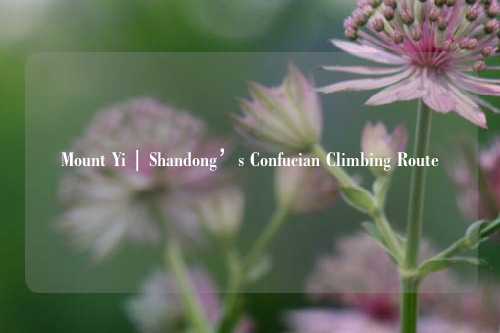Mount Yi | Shandong’s Confucian Climbing Route
A Sacred Peak in Shandong: Mount Yi
Mount Yi, located in the eastern part of Shandong Province, holds immense cultural and historical significance, especially for those interested in Confucianism and traditional Chinese philosophy. Revered for its breathtaking natural scenery, religious landmarks, and historical legacy, Mount Yi offers visitors a deep connection to both the natural world and ancient Chinese culture. It is not only one of Shandong's most famous mountains but also an essential pilgrimage site for Confucian followers, thanks to its strong ties to Confucian teachings and the history of Chinese scholarship. With its lush forests, tranquil atmosphere, and important cultural relics, Mount Yi offers a unique experience that blends spirituality with natural beauty.
A Journey Through History
Mount Yi’s historical roots run deep, particularly when it comes to Confucianism. The mountain is considered one of the most significant sites for Confucian philosophy, closely associated with the teachings and life of Confucius, the great Chinese philosopher. As a place of worship, the mountain is home to numerous temples and shrines that pay homage to Confucius and his followers. These sacred structures attract scholars and spiritual seekers alike, who come to study and reflect upon the teachings of Confucius, whose principles still have a lasting influence on Chinese society.

Throughout the centuries, Mount Yi has been a popular site for imperial families and government officials, who often visited the mountain to pay respects to Confucius. The mountain's close connection to Confucianism has earned it the title of a “Confucian climbing route,” where followers walk the same paths once traversed by ancient scholars and emperors seeking wisdom and guidance. These historical pathways continue to be a focal point for visitors today, providing a physical and symbolic connection to China's deep philosophical traditions.
Mount Yi’s Natural Beauty
In addition to its historical and cultural significance, Mount Yi is a natural wonder in its own right. The mountain is known for its rugged landscapes, dense forests, and majestic peaks, which create a serene environment perfect for contemplation and reflection. As visitors climb the mountain, they are greeted with stunning panoramic views of the surrounding plains and valleys, which add to the spiritual atmosphere of the place. The quiet ambiance and fresh mountain air provide the perfect backdrop for hiking, meditation, and exploring the natural wonders of the area.
The mountain is also home to an array of plant and animal species, adding to its ecological value. Dense forests of ancient trees, vibrant wildflowers, and tranquil streams create a peaceful setting for those seeking solitude in nature. The varied topography of the mountain, with its jagged cliffs, winding paths, and hidden caves, provides an ideal setting for adventurers and nature lovers alike.
Confucian Temples and Cultural Relics
One of the most striking features of Mount Yi is the presence of numerous Confucian temples and shrines, which are scattered across the mountain. These temples are dedicated to Confucius, his disciples, and other influential figures in Confucian philosophy. The temples offer a glimpse into the spiritual practices of ancient China, with many featuring intricate architecture, ornate decorations, and inscriptions that reflect the values and teachings of Confucius.
Among the many temples, the Confucius Temple on Mount Yi stands out as one of the most important. This temple is dedicated to honoring Confucius, and it is a place where people come to seek wisdom, offer prayers, and participate in ceremonies related to Confucian philosophy. The temple complex includes various halls, pavilions, and courtyards, all designed to reflect the reverence for knowledge, learning, and moral conduct that Confucius championed.
In addition to the temples, Mount Yi is home to several cultural relics, including stone tablets, statues, and inscriptions, which provide a deeper understanding of the mountain’s cultural heritage. These relics are an essential part of the site’s identity, allowing visitors to connect with the rich history and intellectual legacy of the area.
Climbing the Sacred Mountain
Mount Yi has long been a destination for pilgrims and scholars, drawn by both its religious significance and its natural beauty. The climbing route is both a physical challenge and a spiritual journey, with a series of stone steps and winding paths that lead up the mountain’s steep slopes. As visitors ascend, they pass through ancient gates and stone carvings, which mark the way to the summit.
The climb is not only a test of physical endurance but also an opportunity for introspection. Many people come to Mount Yi to engage in spiritual practices, such as meditation or prayer, as they make their way to the top. The summit provides a stunning view of the surrounding landscape and is often seen as a place where one can experience a sense of enlightenment or connection with the divine.
Cultural Significance of Mount Yi
The cultural importance of Mount Yi is undeniable. The mountain is an essential part of the Confucian pilgrimage route and holds significant value for those who follow Confucian principles. The teachings of Confucius emphasize morality, respect for tradition, and the pursuit of knowledge, all of which are symbolized by the mountain and its surrounding temples.
Historically, Mount Yi served as a site for official ceremonies, where emperors and scholars would gather to honor Confucius and seek his wisdom. It remains a central point for Confucian rituals, with special events and ceremonies still held at the mountain to this day. The continued use of Mount Yi for such practices ensures that its cultural and spiritual legacy is preserved for future generations.
The Serenity of Mount Yi
In addition to its cultural and historical significance, Mount Yi offers a serene environment perfect for quiet reflection and relaxation. The mountain’s remote location, surrounded by forests and rolling hills, creates a sense of peace that allows visitors to disconnect from the hustle and bustle of modern life. Hiking along the trails, listening to the sounds of nature, and soaking in the spiritual energy of the mountain provides a much-needed escape for those seeking peace and tranquility.
Many visitors come to Mount Yi not just for its historical and cultural importance but for the opportunity to reconnect with nature and themselves. Whether spending time in one of the temples, walking the sacred trails, or simply sitting in silence on one of the mountain’s rocky outcrops, Mount Yi offers a profound sense of peace that is hard to find elsewhere.
Year-Round Destination
Mount Yi is an all-season destination, with each time of the year offering a different experience. In spring, the mountain is covered in lush greenery, with flowers blooming in vibrant colors. The warmer months bring a sense of renewal, as the forest comes alive with birdsong and fresh foliage. Autumn transforms the mountain with golden and red leaves, offering a stunning backdrop for photographs and reflection. In winter, the mountain is quiet and serene, with snow-covered landscapes creating a peaceful atmosphere perfect for meditation and contemplation.
No matter the season, Mount Yi’s beauty and spiritual significance remain constant. Visitors can experience the mountain’s natural and cultural offerings throughout the year, making it a perfect destination for those seeking connection with both nature and ancient traditions.
A Destination for Pilgrims and Adventurers
For those who wish to connect with China’s deep philosophical traditions or explore its natural beauty, Mount Yi offers the perfect setting. Whether for spiritual reflection, cultural exploration, or simply the joy of hiking through a beautiful landscape, Mount Yi provides a diverse and enriching experience for visitors. It is a place where history, nature, and philosophy intersect, offering a profound sense of discovery for those who embark on its sacred climbing route.
















